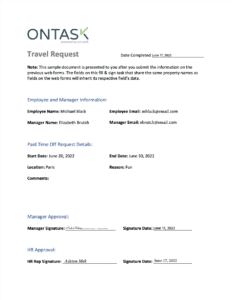Contract negotiation can be nerve-racking — especially for organizations that still rely on manual methods.
Lengthy cycles, poor communication, inconsistent practices, limited visibility, and human errors are common in manually run negotiation processes. It’s just a fact.
The result: misunderstandings, friction, and unnecessary delays between parties in the overall contracting process.
Luckily, with contract negotiation automation, you can make the process more transparent, collaborative, and efficient.
What is Contract Negotiation Automation?

Contract negotiation automation is a streamlined version of the negotiation process that uses technology to automate every piece of the workflow, including the negotiation, deliberation, and communication between two parties over the terms of a contract.
The aim is to help all parties reach a win-win situation and build a relationship, without the hassle of dealing with paper documents. Long before an agreement gets signed, multiple people jump in and out of the document, making changes, and flagging areas that need work.
Contract negotiation software eliminates the manual work that happens during negotiations to streamline the process and reduce time and costs. That way, things can move faster and the parties can work out accurate and favorable contract terms.
Curious about how you can take back control of your processes? Read our contract automation guide to get started.
Top Benefits of Contract Negotiation Automation
Contract negotiation automation brings numerous benefits of contract management automation to the overall negotiation process. And best of all, it makes your entire process repeatable, to ensure your firm keeps feeling the benefits into the future. Let’s review some of the top benefits for law professionals:
Shortened Deal Cycles
If your company still prepares and negotiates contracts manually, the process probably drags on longer than it should, leaving your team exhausted from the back and forth.
Contract negotiation automation tools shorten the sales or deal cycles, leading to higher closing rates and increased revenue. What would take days or even weeks to complete can be closed within minutes, which also:
- Prevents deals from falling apart
- Allows for faster customer provisioning
- Creates positive experiences for prospects, clients, and employees
- Ensures faster time to revenue
Status Alerts and Automatic Reminders
Many deals sit on hold as employees chase down signatures and approvals to complete the negotiation process.
Automation helps legal teams work more efficiently with external contacts by sending automatic reminders and status alerts or notifications to authorized signatories for faster sign-off on the agreement terms.
Consolidated, Accurate Contract Data
Contract management software centralizes contract data in a single electronic repository. This eliminates the errors and confusion often found in a paper-based or traditional approach.
The contract data is always up-to-date, accurate, complete, and available for permitted personnel to use. There’s no chance of using insufficient or outdated data and the system flags any clerical mistakes before they’re entered into documents.
Key Components of Contract Negotiation Automation
For contract negotiation automation to work, there are three essential elements involved that ensure the document has all the desired elements and is legally binding before sign-off. Let’s review the key components of contract negotiation automation:
Artificial Intelligence (AI) and Machine Learning
Contract negotiations can be time-consuming when handled manually or through multiple digital platforms.
The routine side of contract management often pulls your legal departments and business teams from their strategic work. They end up spending hours each week negotiating routine agreements, which a contract negotiation automation tool can do faster and more efficiently.
The AI and ML technology embedded in the contract automation software handle routine, repetitive tasks, eliminating tedious manual work and mitigating risk from human error. They also reduce time spent on manual processes, improve efficiency, and speed up negotiations.
Natural Language Processing (NLP)
NLP improves document categorization and search features in a contract lifecycle management (CLM) solution. Having more accurate and faster searches means lawyers can quickly find precedent during negotiations.
NLP can also read and understand clauses and the contract language in legal documents and flag issues like time-sensitive provisions and ambiguous language.
In addition, NLP pulls information from multiple sources, such as a form, spreadsheet, or chatbot, allowing software to create contract drafts.
Data Analytics and Extraction
Contract negotiation automation tools can easily scan any contract document, making it searchable and providing information for AI to use when extracting and analyzing data.
Proprietary deep learning models perform contextual proofreading and grammatical and spelling checks to reduce mistakes on the contract documents. They can also read tables to extract and parse the information, making it easier for your team to find opportunities for further negotiation and faster approval.
How to Automate Contract Negotiation
Now that you know the benefits and components of a contract negotiation automation solution, you can automate the process with the steps below.
1) Identify Contract Negotiation Requirements
The contract negotiation process starts with initial discussions to identify each parties’ needs, interests, and expectations. Identify the areas where you may agree and disagree on contract terms, provisions, and other areas that require further clarification or discussion to make the process smoother.
2) Select Contract Automation Software
Before selecting the contract automation tool to use, know your organization’s needs to identify the features that best align with your requirements. Evaluate factors like ease of use, scalability, and cost to increase the likelihood of everyone in your team using it effectively.
Examine security features each potential platform offers. This includes encryption capabilities for data protection and compliance management with applicable regulations and laws around sensitive information.
3) Define Contract Templates
Contract templates create legally binding documents in minutes. In most firms, legal counsel want to retain control over the details of the agreements and how they’re used.
In an automated workflow, your legal team can define and revise the contract terms through contract templates so other departments can self-serve from the templates without altering the language of the agreement.
These templates have fillable fields or smart fields where you can enter key data such as contact information, dates, and so on, making the contract seamless and searchable.
4) Configure Negotiation Workflows
Although contracts have many applications, it’s important your legal team retains control and oversight over the negotiation terms and overall workflow. Set up and configure an approval workflow so your legal team can review each contract before it goes out.
5) Integrate eSignature Solutions
Use a secure eSignature solution to sign contracts faster and safely. Depending on the size and structure of your company, authorized signatories may vary from people within your sales team and contract managers to CEOs.
You can integrate an eSignature tool like Docubee to ensure the workflow is frictionless, particularly if you’re in a high-growth business with large volumes of contacts.
6) Implement Negotiation Collaboration Tools
Negotiate faster with collaboration tools like internal commenting and suggestions, automatic approval and review reminders for internal and external stakeholders, and version sharing to put everything in one page in real-time.
These tools also help you stay in control and maintain transparency by providing extensive audit trails and version comparisons or history permissions for all collaborators.
7) Incorporate AI-Powered Contract Analytics
AI-powered contract analytics provide key data points, important clauses, and language recommendations based on industry standards and best practices. That way, you can optimize the content of your contracts and ensure consistency across legal documents.
8) Establish Approval Workflows
Set up approval workflows to define roles for your authorized legal approvers. This ensures contracts move quickly between all parties and stakeholders during the negotiation process.
9) Monitor Negotiation Progress
In the traditional contract negotiation process, contracts would be locked away in storage cabinets pending approvals or sign-off. Moreover, it meant lots of files, which could get lost or misplaced easily, resulting in data loss.
Contract automation tools eliminate these risks, allowing you to monitor the negotiation process as each piece of data is searchable and structured. And, you won’t have version control or monitoring challenges as everything is available in a centralized contract repository.
10) Continuously Improve the Automation Process
Set key performance indicators (KPIs) to track contract progression. Track contract approval to manage the process as it requires constant re-evaluation and negotiations before approvals.
Analyze and monitor any contract risks to avoid losses. You can implement regular compliance reviews to manage and anticipate any changes in the negotiation process and minimize any risks.
Leverage data collected during negotiation to improve the process and ensure your AI, ML, and NLP models are up-to-date and effective.
What is Contract Negotiation Automation Software?
Contract negotiation automation software is a tool designed to reduce administrative work and make the contract negotiation process frictionless. The tool comes with a certain set of features that make it easier and quicker to negotiate contracts with counterparties.
Features of Contract Negotiation Automation Software
Document Generation
Contract negotiation automation software contains pre-approved contract templates that enable your team to create and generate contracts faster so they can handle more complex legal matters.
You can automatically assemble negotiation-ready contract documents based on business rules, ensuring the most recent format, language, and compliance is implemented in legal agreements.
Workflow Automation
Workflows ensure your team and contract parties follow all steps properly.
Contract negotiation tools provide easy to use workflow designers that allow you to define multiple steps, assign tasks, send out alerts or reminders, and more. This way, you can keep contracts and tasks moving forward and reduce the time and error involved in manual contract processes.
These tools also send contracts or their particular sections for approval to the right people, in the proper order, and at the right time.
Electronic Signatures
Going paperless with contract negotiation software gives you control over the entire process as you can track everything from the first draft to contract review and approval to final execution.
Many contract negotiation solutions integrate with leading eSignature providers, ensuring a great user experience as your contracts can be signed from anywhere or any device.
Integration Capabilities
When considering a contract negotiation solution, you’ll come across multiple user-friendly options that are scalable and robust. A good tool also offers integration capabilities with mission-critical applications for seamless, unified, digital contract management.
Compliance Management
Regulations are constantly emerging and changing. Using spreadsheets to audit and report contract compliance can be tedious and cumbersome, especially when you have thousands of active contracts to negotiate and manage.
Contract negotiation software offers advanced auditing and reporting features, helping you retain optimal compliance oversight with internal and external stakeholders.
Get Started Today with Contract Management
Contract negotiation ensures your organization and counterparties get what they want.
If it’s a pain point for your business, and contract volumes are increasing faster than your legal personnel, it might be time to explore contract negotiation automation as a solution.
Docubee—a contract lifecycle management solution—offers contract management that helps teams and counterparties negotiate, agree, and manage contracts in a unified workspace.
Ready to find out more? Schedule a demo.











